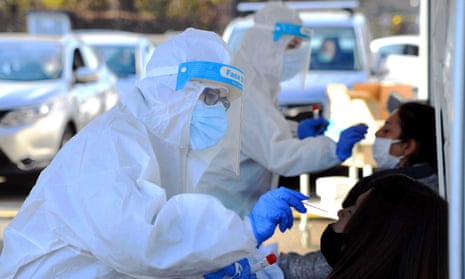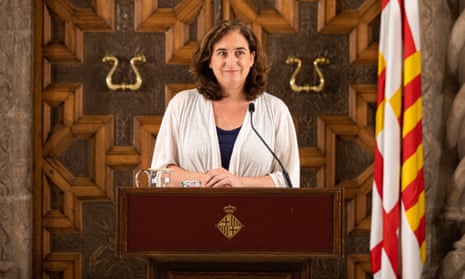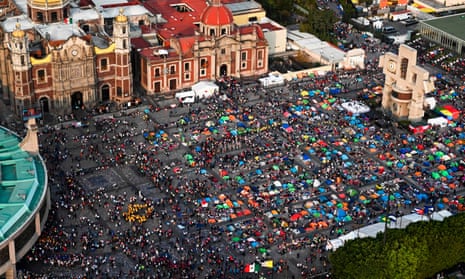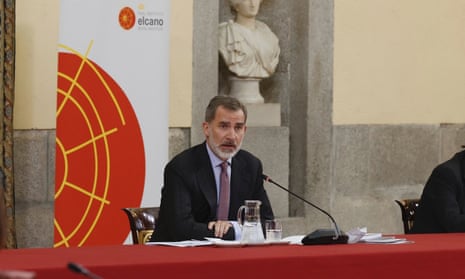We’ve launched a new blog at the link below – head there for the latest:
Italy reports 630 Covid-linked deaths in a day – as it happened
This blog is now closed. We’ve launched a new blog at the link below:
Mon 23 Nov 2020 18.37 EST
First published on Sun 22 Nov 2020 18.40 EST- Summary
- UK aims to inoculate those most at risk from Covid by Easter - prime minister
- Daily Covid-19 cases in France at near two-month low
- New infections in Gaza spiralling out of control
- Summary
- Italy reports 630 Covid-linked deaths, bringing its overall toll to above 50,000
- Russia suffers worst daily caseload increase
- Indonesia exceeds 500,000 cases
- Oxford vaccine up to 90% effective, tests show
- China tests millions after coronavirus flare-ups in three cities
- Summary
- Chaos at Shanghai airport after sudden decision to test thousands - reports
- South Korea reports 271 new coronvirus cases
- Hong Kong-Singapore travel bubble pops
- Global cases near 60m
- US suffers one Covid death every minute
- NHS told to be ready to administer vaccine by 1 December
- Spain to begin vaccinations in January
- UK government to ease isolation requirements for Covid contacts
- US vaccine program head says first Americans could be vaccinated on 11 December
- Germany may start Covid-19 vaccine programme in December
- Summary

Live feed
- Summary
- UK aims to inoculate those most at risk from Covid by Easter - prime minister
- Daily Covid-19 cases in France at near two-month low
- New infections in Gaza spiralling out of control
- Summary
- Italy reports 630 Covid-linked deaths, bringing its overall toll to above 50,000
- Russia suffers worst daily caseload increase
- Indonesia exceeds 500,000 cases
- Oxford vaccine up to 90% effective, tests show
- China tests millions after coronavirus flare-ups in three cities
- Summary
- Chaos at Shanghai airport after sudden decision to test thousands - reports
- South Korea reports 271 new coronvirus cases
- Hong Kong-Singapore travel bubble pops
- Global cases near 60m
- US suffers one Covid death every minute
- NHS told to be ready to administer vaccine by 1 December
- Spain to begin vaccinations in January
- UK government to ease isolation requirements for Covid contacts
- US vaccine program head says first Americans could be vaccinated on 11 December
- Germany may start Covid-19 vaccine programme in December
- Summary
Cities must move to the frontline of efforts to fight gender inequality, which has grown worse in the coronavirus pandemic, said six mayors from three continents as they joined forces in a new network to advance women’s rights.
Around the world, women’s jobs, unpaid labour, health and safety have been upended by the impacts of Covid-19 and need critical attention, said the leaders of City Hub and Network for Gender Equity (Change).
The network aims to promote and share innovative projects focused on combating gender inequality with city mayors around the world.
“Local governments can and should lead,” said Los Angeles mayor Eric Garcetti, the network’s first chair, who joined the mayors of Barcelona, Freetown, Mexico City, London and Tokyo in an online webinar with the media.
Data from the World Economic Forum shows that at the current pace, the gender pay gap will not close for 257 years, he said. “We must act with urgency,” Garcetti said. “We can’t allow this pandemic to set us back further.”
Women’s jobs have been 1.8 times more vulnerable to being lost in the pandemic than men’s, said a study by consultants McKinsey & Co, while government data showed of the 1.1 million US workers who dropped out of the workforce in September, 80% were women.
In Los Angeles, every city department must have a gender action plan and show progress on tackling gender inequality, such as appointing women to boards and top positions, closing the gender pay gap and ensuring more girls use public spaces like sports fields, Garcetti said.
Ada Colau, the first female mayor of Barcelona who called her administration a “feminist government”, singled out unpaid care work of children and ageing relatives.
“We must fight against the inequality and injustice that women still suffer and end the invisibility of care work – a burden which is mostly borne by women,” Colau said.

London’s mayor, Sadiq Khan, who called himself as a “proud feminist”, said a report found in England, mothers were 47% more likely than fathers to have lost or left their jobs in the pandemic.
With women accounting for eight out of 10 people in low-paid jobs, London’s government has invested £3m to “re-skill” and “up-skill” women for better-paying jobs, he said.
“I want gender equity hardwired into everything we do, not simply child care, though important it is, but from housing to a hiring policy to recruitment retention from policing to the environment,” Khan said.
Mexico City mayor Claudia Sheinbaum said a key priority is combating domestic violence that has worsened during lockdown.
The city government has launched a network of 100 female lawyers who help women file reports of domestic abuse and provide free legal advice, she said.
Two-thirds of the city’s 50,000 small businesses loans provided since the pandemic started have gone to help women become economically independent, Sheinbaum said.
In Sierra Leone’s capital, Yvonne Aki-Sawyerr, the first female mayor of Freetown, said she was focused on stemming the world’s highest maternal mortality rates and supporting working mothers with child care.
Last month, Freetown’s government launched a digital mobile phone literacy programme aimed at women and opened the city’s first free day care for young children of market traders, most of whom are women, she said.
Premier League clubs can welcome back spectators in highly limited numbers next month for the first time since March, following an announcement by the British government.
Up to 4,000 people can return to outdoor sports stadiums in parts of England classified as at low risk from coronavirus from 2 December, permitting the resumption of attendance at football, rugby and racecourses among other sports.
The crowd ceiling will be set at 4,000 or half the stadium capacity, whichever is lower, in the lowest-risk tier 1 parts of the country once a stricter lockdown due to the pandemic ends.
In tier 2 areas, the limit will be 2,000 outdoors, or half the capacity, it said.
In the highest tier 3 regions where Covid-19 remains acute, no spectators will be allowed.
A few pilot events have been held with spectators, such as a cricket match at The Oval, while Brighton hosted Chelsea before this season’s Premier League got underway.
However, England’s football and rugby leagues, and horse racing venues, have not allowed spectators since the first lockdown began in March.

Rugby and racing were among the sports to receive financial aid from the government last week. Sports facing financial losses as a result of the absence of fans from stadiums can access a £300m winter survival package of loans and grants.
The government said it would spell out which regions of England will sit in which tier on Thursday, based on the latest weekly Covid data. Before the current lockdown, most of the country including London was in tier 2.
But three of the biggest Premier League clubs – Liverpool, Manchester United and Manchester City – are located in what were previously the highest tier 3 areas, so it remains to be seen whether they will be allowed to admit fans after 2 December.
The government said that where spectators are allowed, only home fans will be permitted, to prevent unnecessary travel on public transport by opposing fans.
Brazil reported a further 16,207 coronavirus cases in the past 24 hours, and 302 deaths.
The South American country has now registered 6,087,608 cases since the pandemic began, while the official death toll has risen to 169,485, according to government data, in the world’s third worst outbreak outside the US and India.

The White House plans to hold indoor holiday receptions in the coming weeks despite the advice of public health professionals urging Americans to sacrifice their normal holiday gatherings to curb the spread of the virus.
US officials have warned against large gatherings on Thursday’s Thanksgiving holiday, instead urging Americans to stay at home and forgo travelling to see relatives as Covid cases topped 12 million over the weekend.
The White House said President Donald Trump and his wife, Melania,will remain in Washington this week, skipping their annual Thanksgiving at Trump’s private club in Florida, and the first lady plans to hold a holiday reception a few days later on 30 November, according to an invitation obtained by ABC News.
It follows a series of White House events in recent months that have been linked to outbreaks, including Trump’s own bout with the disease from late September into early October. A White House aide and four others have tested positive in recent days.
Stephanie Grisham, a spokeswoman for the first lady, said the White House would provide the “safest environment possible” for the Christmas and Hanukkah celebrations with smaller guest lists than years past, masks “required and available,” social distancing encouraged and hand sanitiser provided.
“Guests will enjoy food individually plated by chefs at plexiglass-protected food stations. All passed beverages will be covered,” she said in a statement. “Attending the parties will be a very personal choice. It is a longstanding tradition for people to visit and enjoy the cheer and iconic decor of the annual White House Christmas celebrations.”
Health professionals within the administration have advised against large indoor gatherings.
“We want everyone to understand that these holiday parties can be super spreader events,” US surgeon general Jerome Adams told ABC News, urging celebrations to be held outdoors with as few people as possible and pointing to recommendations by the US Centers for Disease Control and Prevention.
“These apply to the White House, they apply to the American people, they apply to everyone,” Adams said.
While the number of US air travellers was still down about 60% compared to a year ago, federal transportation officials on Monday reported screening the highest number of passengers since March.
Summary
Here’s a quick recap of the latest coronavirus developments across the globe:
- Daily Covid-19 cases in France at near two-month low. France reported 4,452 new Covid-19 infections on Monday, the lowest daily tally since 28 September, suggesting a second national lockdown is having an impact.
- UK aims to inoculate those most at risk from Covid by Easter. The British prime minister, Boris Johnson, said he hoped almost all Britons at high risk from Covid-19 would be vaccinated against the disease by Easter. He also said people will not be forced to have vaccinations against Covid-19.
- Spain’s king self-isolating after virus contact. Spain’s King Felipe VI has started 10 days of quarantine after coming into close contact with someone who later tested positive for Covid-19, the palace said.
- Pope says anti-maskers stuck in ‘their own little world of interests’. Pope Francis has taken aim at protests against coronavirus restrictions, contrasting them with the “healthy indignation” seen in demonstrations against racism after the death of George Floyd.
- New infections in Gaza spiralling out of control. The mounting number of coronavirus infections in densely populated Gaza is spinning out of control, Palestinian health officials warned. Bassem Naim, a senior Hamas official, said the health ministry “expects the worst if the epidemiological situation remains the same” citing “a health system at the end of its rope”, “severe drug shortages” and “extreme overcrowding”.
India will be given first priority for the delivery of the AstraZeneca/Oxford vaccine after its British developers claimed success following mass testing, the world’s largest vaccine manufacturer by volume has said.
The chief executive of the Serum Institute of India, Adar Poonawalla, said the manufacturer has already produced 40m doses of the vaccine so far.
Poonawalla, whose father founded the vaccine manufacturer, told television broadcaster NDTV they should have 100m doses by January.
He said he expected some 90% of Serum Institute’s doses were to be sold to the Indian government at around 250 rupees ($3), while the rest would be sold to the private markets for the higher price of 1,000 rupees.
With an emergency use licence, they hoped to start rolling the vaccine out in December or January, Poonawalla added.
AstraZeneca and Oxford University said their drug has up to 90% efficacy and can be transported easily at normal refrigerator temperatures - unlike some of the other candidates, which require extremely cold storage.
AstraZeneca said it planned to produce up to 3 billion doses of the vaccine in 2021 if it passes the remaining regulatory hurdles.
Indian health minister Harsh Vardhan told India Today TV he expected 250-300 million Indians would be immunised by September next year.
First would be health workers, other frontline workers including the police, paramilitary and those working in sanitisation, as well as people aged above 65, Vardhan added.
Prime minister Narendra Modi is expected to meet state leaders on Tuesday for discussions about the distribution of the vaccine, local media reported.
India is the second worst-infected nation after the US, with more than 9.1 million virus cases.
Pope Francis has taken aim at protests against coronavirus restrictions, contrasting them with the “healthy indignation” seen in demonstrations against racism after the death of George Floyd.
“Some groups protested, refusing to keep their distance, marching against travel restrictions – as if measures that governments must impose for the good of their people constitute some kind of political assault on autonomy or personal freedom,” he said in a new book.
He railed against those who claim “that being forced to wear a mask is an unwarranted imposition by the state”.
You’ll never find such people protesting the death of George Floyd, or joining a demonstration because there are shantytowns where children lack water or education, or because there are whole families who have lost their income.
On such matters they would never protest; they are incapable of moving outside of their own little world of interests.
UK aims to inoculate those most at risk from Covid by Easter - prime minister
The British prime minister Boris Johnson said he hoped almost all Britons at high risk from Covid-19 would be vaccinated against the disease by Easter.
“We should be able to inoculate, I believe on the evidence I’m seeing, the vast majority of the people who need the most protection by Easter,” Johnson told a news conference.
He also said people will not be forced to have vaccinations against Covid-19.
There will be no compulsory vaccination. That’s not the way we do things in this country.
We think it (vaccination) is a good idea, and you know I totally reject the propaganda of the anti-vaxxers, they are wrong.
Everybody should get a vaccine as soon as it is available.
Mexican church and civic leaders have cancelled an annual gathering that attracts massive crowds of Catholic pilgrims, to protect people amid an intensifying coronavirus outbreak.
The feast day of the Virgin of Guadalupe celebrated on 12 December typically features lavish pageantry at her namesake basilica in the north of Mexico City where throngs of pilgrims arrive on their knees in prayer.
But this year the festivities will move online, according to a statement issued by the bishops’ conference and city government.
“The health conditions the country is experiencing due to Covid-19 do not permit us at this time to celebrate the Virgin of Guadalupe together at her sanctuary,” the statement said.
The closure will run from 10 December through 13 December, and a security perimeter will be erected to ensure compliance.

The basilica is the most visited Catholic shrine of the Americas and was built next to a hill where legend holds that Jesus’s mother, Mary, appeared to an Aztec man.
The authorities said that while millions would like to attend the celebration “in search of comfort in the face of anguish, despair and helplessness... the common good motivates us to take containment measures to avoid further spread of the virus.”
Since the pandemic reached Mexico in the spring, most in-person religious gatherings, including Catholic Masses, have been pared back or cancelled and replaced with online services.
Spain’s King Felipe VI has started 10 days of quarantine after coming into close contact with someone who later tested positive for Covid-19, a Royal House source said.
The king, 52, has cancelled his public appearances during the quarantine period after the person tested positive on Monday, one day after they were in close contact, the source added.
Felipe VI had chaired a scientific meeting in Madrid earlier on Monday.
Queen Letizia and their two daughters will continue their royal activities, the source said.


Hi everyone, this is Jessica Murray taking over the global liveblog for the next few hours.
As always, please do get in touch with any story tips or personal experiences you would like to share.
Email: jessica.murray@theguardian.com
Twitter: @journojess_